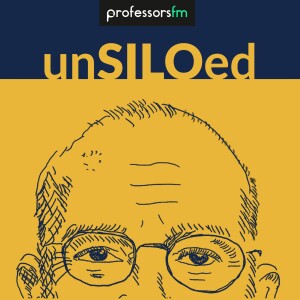
439. The Psychology Behind Misbelief and Conspiracy Theories feat. Dan Ariely
 2024-07-12
2024-07-12
What if you could understand why rational people sometimes believe the most irrational things?
Dan Ariely is a Professor of Psychology and Behavioral Economics at Duke University, the Center for Advanced Hindsight, and is also the author of several books including his most recent work, Misbelief: What Makes Rational People Believe Irrational Things. His work is also the subject of a new TV show called The Irrational.
Greg and Dan discuss many aspects of misbelief and irrationality. Dan describes his own journey of finding himself at the center of different conspiracy theories during the COVID-19 pandemic where he unexpectedly found himself accused of being part of a sinister plot. This shocking experience spurred him to delve deep into the phenomenon of misbelief, and he shares his invaluable field research and insights on this perplexing topic.
Dan also explains the concept of "Shibboleth" as a social marker in political discourse, examining how language and terminology often signify group membership rather than convey actual beliefs. Dan and Greg discuss the critical role of maintaining transparency and trustworthiness in scientific communication and reflect on the evolving role of academia in addressing societal issues.
*unSILOed Podcast is produced by University FM.*
Episode Quotes:
Are we in a period of low resilience?
19:25: We are at a period of high stress and low resilience. Why do we have low resilience? Because we spend less time with friends. We spend more time with our nuclear family. We have less good friends for all kinds of reasons, but, you know, for example, one of them is that we're not allowed to have friends at work anymore. And what I mean by that is that there are topics that you can't talk about at work. It’s frowned upon to talk about sexual issues. It's frowned upon to talk about politics. We spend lots of time with those people. It used to be the place where you got new friends. Now it's not anymore, right? There's not that much going out with friends after work to drink. And you don't know much about the people that we work with.
Redefining misbelief
06:14: Misbelief is not just about believing in something that isn't so; it's also about adopting it to such a degree that it colors everything we look at. And that's the dangerous thing, right? Because the moment you have some belief…[06:37] it becomes a central tenet in the way you interpret the world; it becomes much broader than that because you start being suspicious and so on.
Why does replication matter in social science?
52:20: I think there are lots of reasons why things don't replicate. I think that intention is a very small subset. And my hope is that we will grow as a science. We need to be more careful, and so on. But we also need to understand that lack of replication sometimes is just asking another question of what was different between those two things rather than saying, "Oh, it must mean that the first one was not correct. And the second one is correct."
The high cost of incorrect beliefs
23:43: We live in a world in which some wrong beliefs can have very large consequences. So I don't know if people believe in more incorrect things; probably we believe in less incorrect things, but I think that the cost of believing in incorrect things can be much higher.
Show Links:
Recommended Resources:
- The Irrational
- Bronisław Malinowski
- Shibboleth
- Friedrich Schiller
- Cui bono?
- Richard Thaler
- Cass Sunstein
- Diederik Stapel
Guest Profile:
- DanAriely.com
- The Center for Advanced Hindsight
- Profile on LinkedIn
- Wikipedia Profile
His Work:
- Amazon Author Works
- Misbelief: What Makes Rational People Believe Irrational Things
- Dollars and Sense: How We Misthink Money and How to Spend Smarter
- The Honest Truth About Dishonesty: How We Lie to Everyone--Especially Ourselves
- The Upside of Irrationality: The Unexpected Benefits of Defying Logic
- Predictably Irrational, Revised and Expanded Edition: The Hidden Forces That Shape Our Decisions
- TED Talks
- Dan’s Youtube Page
More Episodes
Create your
podcast in
minutes
- Full-featured podcast site
- Unlimited storage and bandwidth
- Comprehensive podcast stats
- Distribute to Apple Podcasts, Spotify, and more
- Make money with your podcast
It is Free
- Privacy Policy
- Cookie Policy
- Terms of Use
- Consent Preferences
- Copyright © 2015-2024 Podbean.com






